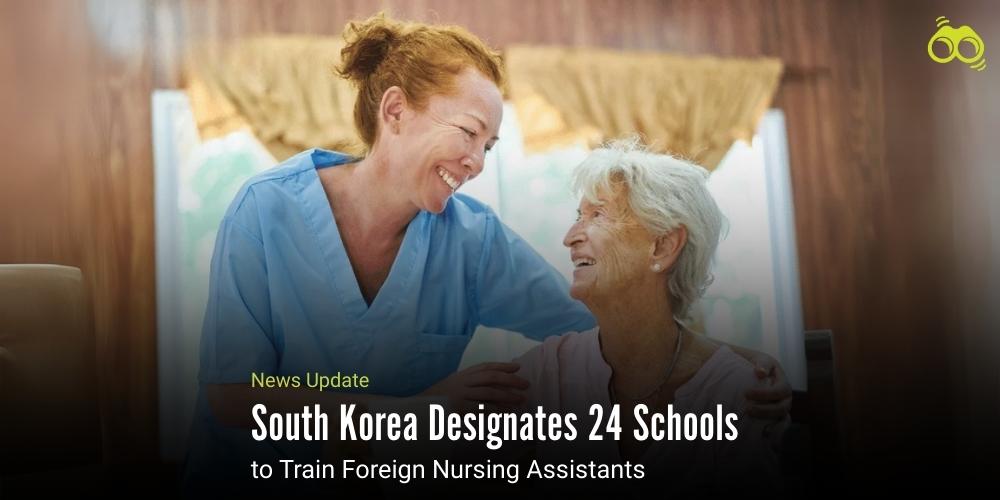Korea Expands Nursing Assistant Training to Foreign Students Amid Workforce Gaps
Government Launches Pilot to Address Healthcare Labour Shortage
South Korea has announced the selection of 24 institutions nationwide to train foreign nursing assistants, as confirmed by the Ministry of Justice and the Ministry of Health and Welfare on 24 August. Among the designated institutions are Myongji College and Sahmyook Health University in Seoul, Kyungnam College of Information & Technology in Busan, and Jeju Tourism University on Jeju Island. These institutions are expected to launch degree programmes tailored to nursing assistant roles from the first semester of 2026.
In addition to academic training, Korean-language instruction will be embedded in the curriculum, in accordance with guidelines issued by the Ministry of Justice. This is intended to support foreign students’ integration into Korean healthcare environments, particularly in eldercare and rehabilitation settings where communication is essential. To facilitate access, the government has announced that financial requirements for visa issuance will be eased for students enrolled in these specialised departments. This measure is part of a broader effort to attract international applicants and address persistent labour shortages in the healthcare sector.
Officials have stated that the programme will be reviewed over two years, after which a decision will be made regarding its permanent adoption. The evaluation will consider institutional capacity, student outcomes, and the programme’s contribution to workforce stability. The Minister of Health and Welfare, Jeong Eun Kyeong, noted that the initiative was designed to secure a reliable supply of nursing assistants and improve their working conditions. She reiterated the government’s commitment to enhancing the professional recognition and treatment of such workers. This pilot scheme coincides with growing demographic pressures in South Korea, where an ageing population and declining birth rates have intensified demand for long-term care professionals. According to labour ministry estimates, the country faces an annual shortfall of over 30,000 nursing assistants, particularly in regional and rural facilities.
Moreover, the initiative reflects South Korea’s evolving immigration strategy, which increasingly targets skilled foreign workers in sectors experiencing acute shortages. Similar pilot programmes have been introduced in agriculture, manufacturing, and construction, signalling a shift towards more structured and sector-specific migration pathways. In parallel, leading institutions such as Seoul National University Hospital have expanded professional development opportunities for foreign healthcare workers, offering observational fellowships and clinical training in specialised fields including cardiology, neurology, and infectious diseases. As the programme unfolds, stakeholders will be closely monitoring its impact on workforce resilience, student integration, and the long-term viability of foreign-trained professionals in Korea’s healthcare system. South Korea is betting on strategic migration to reinforce its ageing care infrastructure.
Editor’s Note
South Korea is strategically intervening in its demographic and healthcare challenges by designating 24 institutions to train foreign nursing assistants. This decision addresses the escalating demand for long-term care, which is becoming unsustainable due to the rapidly ageing population. By 2045, the number of citizens aged 85 and older is projected to triple from 1.13 million in 2024 to 3.72 million. According to the Presidential Committee on Ageing Society and Population Policy, South Korea will face a shortage of nearly 1 million care workers by 2043 if current trends persist. The core domestic workforce, primarily women in their 50s and 60s, is shrinking, and the existing pool of certified caregivers is expected to peak in the mid-2030s before declining. Without bold action, the country risks a collapse in eldercare provision, particularly in regional and rural areas.
South Korea is transforming its immigration and labour strategy by easing visa requirements and integrating Korean language training into degree programs for foreign students. This aims to create a more inclusive and sustainable healthcare workforce, mirroring a broader trend of targeted migration for skilled workers in shortage sectors. This initiative aligns with WHO recommendations for investing in nursing education, employment, and working conditions to address shortages, promote economic growth, and ensure gender equity. South Korea's professionalisation and integration of foreign nursing assistants mark a significant step in this direction.
Skoobuzz believes that if successful, this programme could serve as a model for other ageing societies grappling with similar workforce dilemmas. But its long-term viability will depend on more than just numbers; it will require cultural integration, institutional support, and a commitment to fair treatment and career mobility for foreign healthcare workers.














0 Comments (Please Login To Continue)